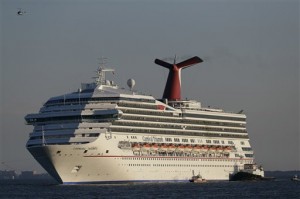
Karen McKinley was invited to a Carnival cruise with her siblings and parents to celebrate her mother’s 80th birthday. However, their plans were foiled when they discovered the ship they were meant to take was the exact vessel that broke down in the Gulf of Mexico, leaving 4,200 passengers stranded at sea for five days.
Although McKinley, a BYU graduate, said she had doubts about the trip from the beginning because of Carnival’s generally shoddy reputation, she was still surprised to hear of the incident and was glad to see that she and her family members had dodged a bullet.
“When it broke down, we were all shocked but somewhat relieved that it happened then instead of when we were on the ship,” she said.
McKinley and her siblings quickly made alternate land-based plans, maintaining no desire to cruise with Carnival after the fiasco.
The Carnival cruise that left thousands of passengers stranded for nearly a week was heavily publicized by many major news outlets and has left some travelers feeling skeptical about cruising with the Carnival line in the future.
While McKinley’s cruise plans fell through, Phoebe Davis has been working with others to book a Carnival cruise trip for a group of fellow BYU students this spring, and their plans still hold. Davis explained that although no one who has bailed from the trip has specifically cited the incident as a motivator, many people who were on the fence about committing to the decision have become even more hesitant, jokingly referring to the recent happenings.
But perhaps their jokes reflect genuine concerns. ABC News reported that conditions on the Triumph were “squalid.” Sewage was seeping down the walls of the ship, carpets were soaked with urine and passengers quarreled over scarce food. Such reports could be more than enough to scare off a potential Carnival cruise-goer.
Amy Schwartz, master cruise counselor at Lancaster Travel, described how the incident may affect cruise sales for the Carnival line.
“I do have clients telling me they will avoid cruising on older Carnival ships in the future,” Schwartz said, explaining the Triumph model was from 1999 and has had similar issues. “Or they will just switch to different comparable lines like Royal Caribbean … I’m sure some clients will now consider spending a little more money to cruise on a newer, maybe more reliable ship.”
However, some, like former Utah State University student Katelynn Bench, say they feel that rather than a deterrent, the incident could be a great reason to take a Carnival cruise in the near future. She explained that her father has suggested that her family look into taking a cruise to the Bahamas, as he predicts prices will decline dramatically.
“It’s sad that this has happened, but there is always a risk any time you travel, whether by car, plane or boat,” Bench said. “I honestly wouldn’t mind going.”
Similarly, Rexburg, Idaho resident Jill Slaughter shared that she and her husband Kyle may now be interested in cruising with Carnival.
“Kyle just said yesterday that he thinks we should go on a cruise with them now because they will be way cheaper and hopefully trying to redeem themselves with amazing service,” she said.
Schwartz explained that she feels the media has been too negative in their reporting of the incident, and that Carnival deserves some credit for the way it has handled the disaster.
“I am certain the crew was doing everything possible they could do under the circumstances,” she said. “I would think after this, all of their older ships are being thoroughly inspected again and this should be the safest the vessels ever were.”




